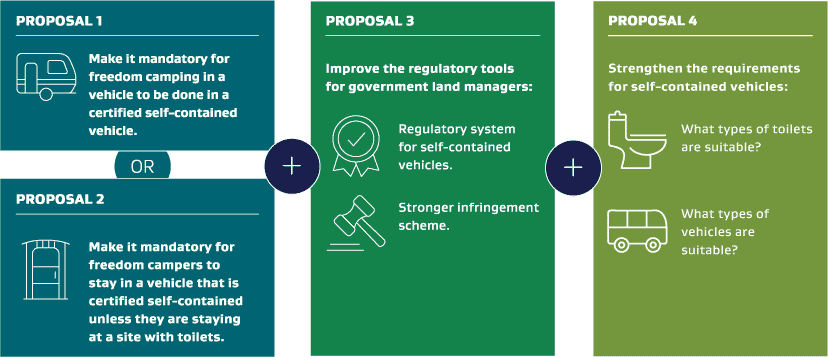Clarity on proposed changes to the types of toilets in scope of proposal 4
Key points:
The Government sought your feedback about the nature and types of toilets that are suitable for a vehicle to be certified as self-contained.
Early feedback we received indicated that the different language used about toilets in proposal 4 – including "permanently plumbed toilet" and "fixed toilet" – was ambiguous and unclear, and made it difficult for you to determine what you were providing feedback on. In the discussion document we referred to both "permanently plumbed" and "fixed" to mean the same thing: a “permanent toilet” as defined in the voluntary standard:
Self-containment of motor caravans and caravans(external link) — Standards NZ
We apologise for the confusion.
Feedback we want from the public on toilets in vehicles for freedom camping:
Under proposal 4, the Government sought feedback on whether the voluntary standard for self-containment of motor caravans and caravans is fit for purpose, including the types of toilets it allows.
The voluntary standard allows several different types of toilet, provided that:
- it is adequately secured while the vehicle is travelling
- the toilet can be used within the vehicle, including sufficient head and elbow room whenever required, even with the bed made up
- it provides sufficient waste holding capacity for the occupants for a minimum of 3 days.
Toilet types specified under the standard include:
- Cassette toilet: a fixed toilet with a removable holding tank.
- Composting toilet: a toilet that is an aerobic processing system to treat human waste, by composting.
- Efficiency flushing toilet: a toilet which is flushed by a small volume of water.
- Marine toilet: a fixed flushing toilet with a macerator pump, either manual or electrically operated.
- Permanent toilet: a toilet that is permanently fixed inside the motor caravan.
- Portable toilet: a toilet with its own holding tank, the toilet is not fixed to the motor caravan.
We sought feedback on whether the different types of toilets currently specified under the standard are appropriate, or whether they should be more restrictive. For example, if only permanent toilets were allowed, this would mean toilets that can be moved around in the vehicle would not be able to be used. We also sought feedback on whether black waste water tanks should continue to be both removable (for example, how a cassette toilet currently operates), and fixed.
Feedback we sought is on whether the current standard, which allows for different types of toilet to suit the type of vehicle, is adequate.
Feedback received prior to this clarification is still valid, and was considered alongside feedback received after this.


